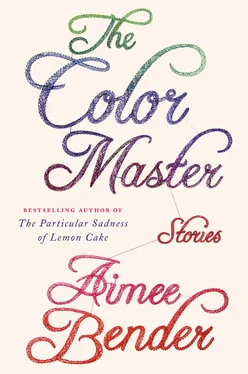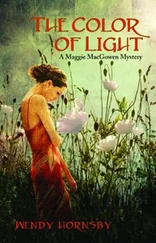Drink your tea, I said.
Listen, she said. It’s important, she said. She shook her head. It was written, in pain, all over her forehead. She sat up higher on her elbows, and looked beyond me, through me, and I could feel meaning, thick, in her, even if I didn’t know the details about why. She picked her words carefully.
You cannot bring it—someone—into the world, and then bring it back into you, she said. It is the wrong action.
Her face was clear of emphasis, and she spoke plainly, as plainly as possible, as if there were no taboo about fathers marrying daughters, as if the sex factor was not a biological risk, as if it wasn’t just disturbing and upsetting as a given. She held herself steady on her elbows. This is why she was the Color Master. There was no stigma, or judgment, no societal subscription, no trigger morality, but just a clean and pure anger, fresh, as if she was thinking the possibility over for the first time.
You birth someone, she said, leaning in. And then you release her. You do not marry her, which is a bringing back in. You let her go.
Put anger in the dress, she said. She gripped my hand, and suddenly all the weakness was gone, and she was right there, an electric pulse of a person, and I knew this was the last time we would talk, I knew it so clearly that everything sharpened into incredible focus. I could see the threads in the weave of her nightgown, the microscopic bright cells in the whites of her eyes.
Her nails bit into my hand. I felt the tears rising up in me. The teacup wobbling on the nightstand.
Got it? she said.
Yes, I said.
I put the anger in the dress the color of sky. I put it in there so much I could hardly stand it—that she was about to die, that she would die unrecognized, that none of us would ever live up to her example, and that we were the only witnesses. That we are all so small after all that. That everybody dies anyway. I put the anger in there so much that the blue of the sky was fiercely stark, an electric blue like the core of the fire, so much that it was hard to look at. It was much harder to look at than the sun dress; the sky dress was of a whole different order. Intensely, shockingly, bluely vivid. Let her go? This was the righteous anger she had asked for, yards of it, bolts of it, even though, paradoxically, it was anger I felt because soon she would be gone.
She died the following morning in her sleep. Even at her funeral, all I could feel was the rage, pouring out of me, while we all stood around her coffin, crying, leaning on one another, sprinkling colors from the dye bins into her hands, the colors of heaven, we hoped, while the rest of the town went about its business. Her brother rolled in on a stretcher, weeping. I had gone over to see her that morning, and found her, dead, in her bed. So quiet. The morning sun, white and clear, through the windowpanes. I stroked her hair for an hour, her silver hair, before I left to tell anyone. The dress request had already come in the day before, as predicted.
At the studio, under deadline, Cheryl led a seminar on blue, and sky, and space, and atmosphere, and depth, and it was successful and mournful, especially during the week after the funeral. Blue. I attended, but mostly I was nurturing the feeling in me, that rage. Tending to it like a little candle flame cupped against the wind. I knew it was the right kind, I knew it. I didn’t think I’d do much better than this dress, ever; I would go on to do good things in my life, have other meaningful moments, share in the experience of being a human being in the world, but I knew this was my big moment, and I had to be equal to it. So I sat at the seminar with half a focus, just cupping that flame of rage, and I half participated in the dyeing of the fabric and the discussion of the various shades, and then, when they had done all they could do, and the dress was hanging in the middle, a clear and beautiful blue, I sent everyone home. Are you sure? Cheryl asked, buttoning up her coat.
Yes, I said. Go.
It was night, and the sky was unlit under a new moon, so it was up to me to find the blue sky—draped over us all, but hidden. I went to the bins, and listened for the chords, and felt her in me. I felt the ghost of her passing through me as I mixed and dyed, and I felt the rage in me that she had to be a ghost: the softness of the ghost, right up next to and surrounding the sharp and burning core of my anger. Both guided my hands. I picked the right colors to mix with blue, a little of so many other colors and then so many different kinds of blue and gray and more blue and more. And in it all, the sensation of shaking my fists at the sky, shaking my fists high up to the sky, because that is what we do when someone dies too early, too beautiful, too undervalued by the world, or sometimes just at all—we shake our fists at the big blue beautiful indifferent sky, and the anger is righteous and strong and helpless and huge. I shook and I shook, and I put all of it into the dress.
Of all people to take back? How impossible to understand that I would never see her again.
When the sun rose, it was a clear morning, the early sky pale and wide. I had worked all night. I wasn’t tired yet, but I could feel the pricklings of it around me, peripheral. I made a pot of coffee and sat in the chill with a cup and the dress, which I had hung again from a hanger in the middle of the room. The rest of the tailors drifted over in the morning, one by one, and no one said anything. They entered the room and looked up, and then they surrounded it with me. We held hands, and they said I was the new Color Master, and I said okay, because it was obvious that that was true, and though I knew I would never reach her levels again, at least for this one dress I had. They didn’t even praise me, they just looked at it and cried. We all cried.
Esther sent off the invoice pigeon, and, with care, we placed the dress in its package, and when the carriage came by, we laid it carefully over the backseat, as usual. We ate our hunk of gift chocolate. We cleaned up the area around the bins and swept the floor of dust, and talked to a builder, a friend of Manny’s, about expanding one of the rooms into an official seminar studio. The carriage trotted off, with the dress in the backseat, led by two white horses.
From what I heard, soon after the princess got the third dress, she left town. The rest I do not know.
The rest of the story—known, I’m told, as “Donkeyskin”—is hers.
On her fortieth birthday, the woman lost the ability to sleep for more than a single hour. She did not accumulate a tired feeling; in fact, that one hour served the purpose of eight, and she awoke refreshed. But because that hour was full of only the most intense, involving sleep, the sleep beyond rapid eye movement, the consequence was that she had no time in her sleep hours for dreams. So, during the day, she would experience moments when the rules of the world would shift and she would see, inside her teakettle, a frog floating, dead. And then blink and it would be gone. Or she would greet the mailman and he would hand her a basket of seawater, dripping, with stamps floating wetly on top. And then she would smile and bring in the mail. These moments sprinkled throughout every day; she still had a driver’s license and wondered if she should revoke it herself, as the zombies who passed through the crosswalk and disappeared into the lamppost were confusing.
She assumed she would die at eighty. She figured this because the sleep shift began on her fortieth birthday and all her life, things had happened symmetrically like that. Her birthdate was 11.25.52, and that was not notable until she realized that she had been born in Amsterdam and there the day comes first: 25.11.52; the address of the only house she could afford for miles and miles was 1441, on a street named Circle Road on the edges of Berkeley. She had a son the day her father died. Her son’s face was almost a perfect mirror of itself, in such a way that one realized how imperfections created trust, because no one trusted her son with that perfect symmetry in his face; contrary to the magazine articles that stated that women would orgasm easily above him, beneath him, due to that symmetry, no—his symmetry was too much, and women shied away, certain he was a player. Certain he would dump them. And because no one approached him, when he did have girlfriends every now and again he would dump them, because he found he did not trust them either, because they were always looking at him so furtively—making, with their faces, the action of holding up your hands in front of your chest to block a blow.
Читать дальше













